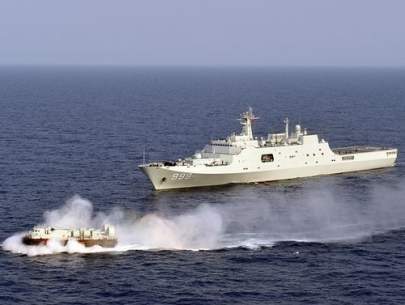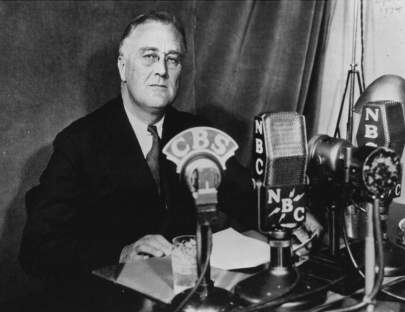Worrisome Words and Dangerous Days

March 2024 — Polls show that American voters are most concerned about immigration (35 percent) and inflation (32 percent). A quarter of voters cite jobs and the economy as their biggest concern. Only 14 percent express concern about national security. As they understandably tend to do in a representative democracy, politicians of both parties are largely focusing on what the voters care about—domestic issues. But with Vladimir Putin trying to reconstitute the Russian Empire, Xi Jinping supersizing his navy and nuclear force, Ali Khamenei unleashing his Hamas-Hezbollah-Houthi hydra, Kim Jong-Un expanding his missile arsenal and these adversaries collaborating to take aim at the Free World, it’s time for statesmen to step up and remind voters that “National security is government's first responsibility,” as President Ronald Reagan observed.
Immigration, inflation and the labor market are important issues. Illegal immigration can even
threaten national security. But we cannot continue to downplay the threats posed by China, Russia, Iran, North Korea and their proxies; we cannot continue to dismiss those threats as distant or secondary; and we cannot continue to deprioritize the tools needed to address those threats.
Warning
The situation calls to mind something President John Kennedy said to his staff: “Domestic policy can only defeat us; foreign policy can kill us.” As Kennedy understood, a domestic-policy failure may cost someone an election, but a foreign-policy failure may cost us everything.
Now, as in Kennedy’s day, statesmen and military leaders confront what most politicians and
most voters fail to see. It’s a frightening picture.
Asked when the U.S. Navy was last engaged in the sort of combat operations it’s conducting in the Red Sea, Adm. Brad Cooper, deputy commander of U.S. Central Command, answered: “You'd have to go back to World War II.”
“We are preparing for a conflict with Russia,” warns Dutch Adm. Rob Bauer, head of NATO’s Military Committee.
“The Russian ground force,” reports Gen. Christopher Cavoli, commander of U.S. European Command, “is bigger today than it was at the beginning of the [Ukraine] conflict.”
“We have to take into account that Vladimir Putin might even attack a NATO country,” warns
Boris Pistorius, Germany's defense minister. “We also have to learn to live with danger again
and prepare ourselves—militarily, socially and in terms of civil defense.”
“I hope I am wrong. My gut tells me we will fight in 2025,” Gen. Mike Minihan, commander of the
Air Force Air Mobility Command grimly predicts, referring to a China-Taiwan-U.S. conflict.
Adm. Samuel Paparo, commander of the U.S. Pacific Fleet, warns that China’s military exercises around Taiwan are so fluid and constant that “Soon, we'll be at a point where a force sufficient to execute a profound military operation is in the field and operating under a fig leaf of exercise.”
“The United States now confronts graver threats to its security than it has in decades, perhaps ever,” former Defense Secretary Robert Gates soberly concludes.
“We're dealing with an adversary, a competitor in China stronger than the Soviet Union was in the 1940s, 50s, 60s, 70s and 80s,” explains U.S. Ambassador to China Nicholas Burns.
“Within the next three years, it must be credible to talk of a British Army of 120,000,” advises Gen. Patrick Sanders, chief of the British General Staff. “But this is not enough.” The government must “mobilize the nation…Ukraine brutally illustrates that regular armies start wars; citizen armies win them.”
“Real war is possible,” according to French Ambassador to the United States Laurent Bili.
“There could be war in Sweden,” predicts Carl-Oskar Bohlin, Sweden’s civil defense minister.
“The Netherlands should be seriously afraid of war,” according to Gen. Martin Wijnen, commander of the Dutch army. “Our society should prepare for it.”
The Free World faces “the most severe and complex security environment since the end of World War II,” Japan’s cabinet concludes, adding that China’s actions “present an unprecedented…strategic challenge.”
Restoring
Yet the vast majority of voters either aren’t aware of the metastasizing threats or don’t care about the threats. That means policymakers and organizations of influence need to do a much better job educating the American people about the danger—and connecting faraway battlefronts with the home front.

There’s a readymade template for how to go about this crucial task: President Franklin Roosevelt turned his “fireside chats” into tutorials about rising international threats—and the need for Americans to face them. Reagan used every tool of the bully pulpit—the State of the Union, Oval Office addresses, press conferences, media interviews and barnstorming stops across the country—to outline the rising Soviet threat and the critical need to rebuild America’s military.
President Joe Biden has not followed their example. Aside from one Oval Office address in October 2023, which explained and connected some of the international crises confronting America, Biden has not used the bully pulpit to educate the American people about the threats arrayed against us—certainly not in the concerted manner needed to awaken a world-weary, inward-looking populace. Moreover, neither the White House nor Congress has put forward a defense budget equal to the moment.
The only way to prevent great-power war is by returning to the time-tested principle of deterrent
military strength. This requires restoring America’s deterrent capability and deterrent credibility, both of which have been diluted by a range of factors: a quarter-century of underinvesting in defense; years of trusting the words of tyrants, rather than using their actions as a guide for policy; disunity and doubt within the Free World fueled by American administrations; the withdrawal from Afghanistan, which was thoughtlessly negotiated by the Trump administration, recklessly executed by the Biden administration and deeply damaging to America’s word.
This urgent task of restoring deterrence must be pursued on two fronts.
First, in the Middle East, as thoughtful retired flag officers have argued, Washington must deliver
punishing blows against things Iran’s outlaw regime holds dear. Those things, by and large, are not located in Syria, Yemen or Iraq—which means retaliatory operations to date have missed
the mark. The Reagan administration’s Operation Praying Mantis (which sank most of Iran’s navy on an afternoon in 1988) is a template for the sort of response that could restore deterrence vis-à-vis Iran.
The other front where deterrence must be restored is related not to kinetic operations, but rather
to economic commitment. After decades of watching America and its allies shortchange defense, Putin, Xi, Khamenei, Kim and their proxies sense weakness; they are moving against that weakness around the world.
For more than a decade, America has invested barely 3 percent of its GDP in defense. The Cold War average was more than twice that. Thus, America’s Army is trying to deter war in Europe with one-third the soldiers it deployed during the Cold War. With only 20 stealth bombers in service, just 14 percent of the Air Force bomber fleet would be able to penetrate Russia’s or China’s air defenses. Navy leaders say they need 500 ships; they have 296.
In short, America cannot contain and deter a Cold War-level threat with a post-Cold War economic mindset and military force.
Preparing
Wise leaders recognize that military readiness paradoxically keeps the peace.
“There is nothing so likely to produce peace as to be well prepared to meet an enemy,” President George Washington counseled. “None of the four wars in my lifetime came about because we were too strong,” Reagan matter-of-factly noted. “Our military strength is a prerequisite for peace.”
If the American people and their elected representatives continue to allow America’s military
strength to drain away and continue to focus solely on domestic issues, our adversaries will test more limits, kill more innocents, trigger more crises and launch more wars.











